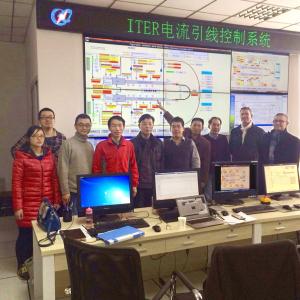The ITER Organization contributed to the test with the delivery of a turn-key
control system, complete with critical quench detection and interlock functions. ITER's Coil Power Supply Section also contributed by delivering a set of flexible copper busbars. These contributions are in fact prototypes of systems that are being procured for the ITER machine, and for which tests in a machine-relevant environment are important steps in their development.
After two long weeks of testing, ASIPP's Kaizhong Ding thanked not only the test team for its hard work, but also acknowledged the valuable support provided by ITER's control, magnet and power supply teams that, in the end, allowed these tests to run smoothly and be completed in time for a well-deserved rest over the Chinese New Year holiday.
Toroidal field and poloidal field/central solenoid prototype leads are now in final stages of manufacturing and test results will be reported in Newsline soon.



